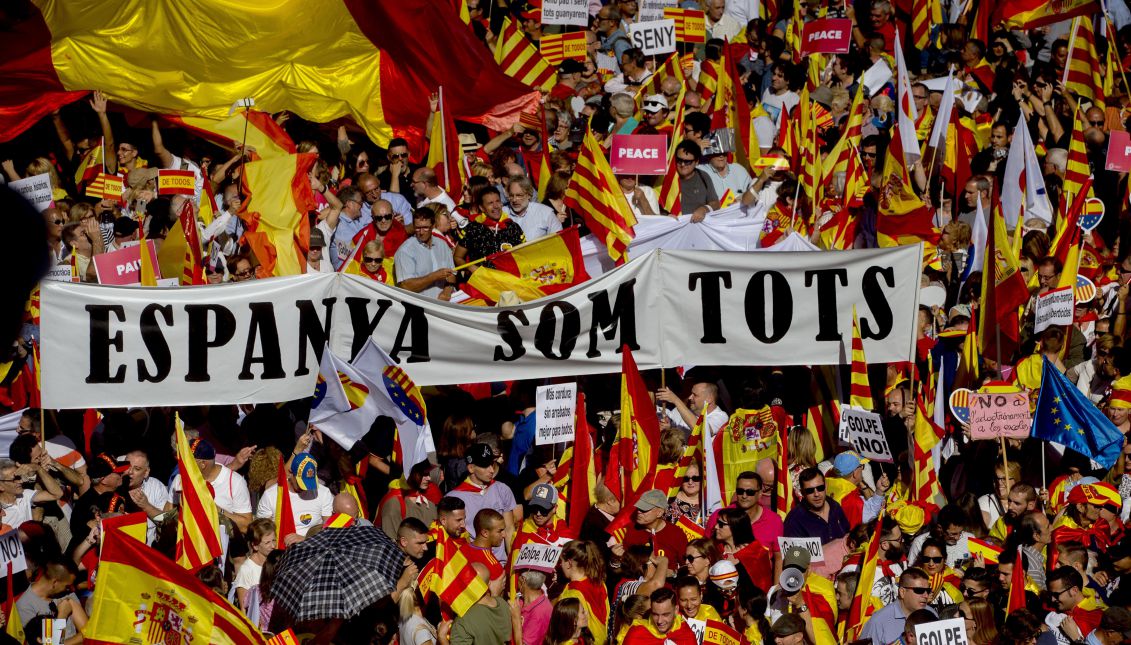
Thousands of Catalans who are against independence from Spain took to the streets of Barcelona on Sunday to protest against a potential declaration of independence today. EFE/Quique García
Will Catalonia Declare Independence from Spain Today?
Ten days after the controversial referendum, Catalan President Carles Puigdemont will address the region’s Parliament today, possibly to declare independence…
After a week of social mobilizations and continued political attacks between Madrid and Barcelona, the capital of Catalonia lived yesterday, finally, a day of calm. However, it was only the typical calm that precedes the storm. Everything is possible if this evening, at 6pm local time, Catalan President Carles Puigdemont, leader of the separatist government, appears before the regional Parliament to declare unilaterally the independence of Catalonia, as planned.
RELATED CONTENT
The possible declaration of independence comes ten days after the controversial referendum for independence held on Sunday, October 1, to which the central government of Madrid opposed at all costs. The call for the independence referendum was approved by the Catalan Parliament, controlled by the separatists, but the Spanish Justice considers it unconstitutional.
In this way, the state government - which has refused for six years to listen to requests for a legal referendum by the separatists - decided to use a heavy handed approach against the referendum. One week before October 1, Madrid ordered the deployment of hundreds of national police officers and civil guards to Catalonia (the region has its own police force, the "Mossos"), which carried out searches in several regional departments, detentions of public officers and confiscations of ballot papers and electoral propaganda.
Despite the police threat, the Generalitat (the Catalan government) decided to push forward with the referendum, with the support of separatist civil organizations that encouraged the citizens to protect the polling stations to avoid that they were sealed. The operation ended in the worst scenario, with national police forces rushing violently against the citizens - many of them elderly people - that were "occupying" the schools. According to the Catalan government, more than 700 people were injured during the police charge. Images of police violence were portrayed in the media throughout the world, while the central government continued to argue that police action was appropriate, and that the agents followed instructions from the prosecution. However, the image of police beating up unarmed voters in the 21st century is not really beneficial for a European democracy.
It is clear that images of police violence have helped to generate "sympathy" with the pro-independence movement around the world, but in the eyes of the international community, the referendum is still unconstitutional and no Western country has said it is willing to recognize the sovereignty of Catalonia. In addition, the confiscation of ballot boxes and ballot papers by the police, as well as the lack of guarantees in the voting system, make it very difficult for the result to be considered legitimate. According to the Catalan government, in the referendum about 43% of the population (about 2.3 million people) participated, and the "yes" won by 90%.
Based on this weak result, the president of the Catalan government intends to declare independence today, as indicated in the Transitory Law passed in the regional Parliament a month ago. The law dictates that the president should declare independence unilaterally 48 hours after he announced the results of the referendum. "It is not a matter of whether or not independence is viable, but a legal obligation with our citizens," said Sergi Sabrià, deputy of ERC, one of the pro-independence forces in the Catalan Parliament, to RTL television.
The central government has already announced that it will take all the "necessary measures" in case President Puigdemont declares independence. One of the most likely measures is to apply Article 155 of the Constitution, which implies the abolition of Catalonia's autonomy and calling for regional elections.
The main Catalan business and economic associations, as well as the editorials of influential Catalan media, such as La Vanguardia, have warned the Catalan government that a Unilateral Declaration of Independence (DUI) would be imprudent, and could plunge the region into a serious economic and social crisis. In recent days, numerous financial institutions and large Catalan companies (Caixa Bank, Banc Sabadell, Agbar, Gas Natural, etc.) have announced they are moving their corporate headquarters out of Catalonia to calm their shareholders. Several threaten to do the same if DUI happens today.
On the other hand, Catalan society is becoming increasingly divided. If until now were mostly the separatists who often took to the streets armed with their "esteladas" ( independentist catalan flag), last Sunday hundreds of thousands of people concentrated in Barcelona to show their support to the unit of Spain. "Until today I had no need to go out with the Spanish flag, but the situation has reached the limit," said one family from Sabadell, a suburb in the north of Barcelona.
The ANC, the main independentist civic platform, has called its supporters to concentrate this evening in front of the Catalan Parliament at the same time that Puigdemont is scheduled to appear before the deputies to announce Independence. The two separatist political forces, ERC and CUP, will press him until the end to declare the DUI, despite the lack of international recognition. France, among other European countries, said it would not recognize the independent state.The Spanish government insists it will take all necessary measures to stop the separatist "coup". And in the meanwhile, the opposition, and much of the population, has no choice but to trust that common sense will be imposed.











LEAVE A COMMENT: